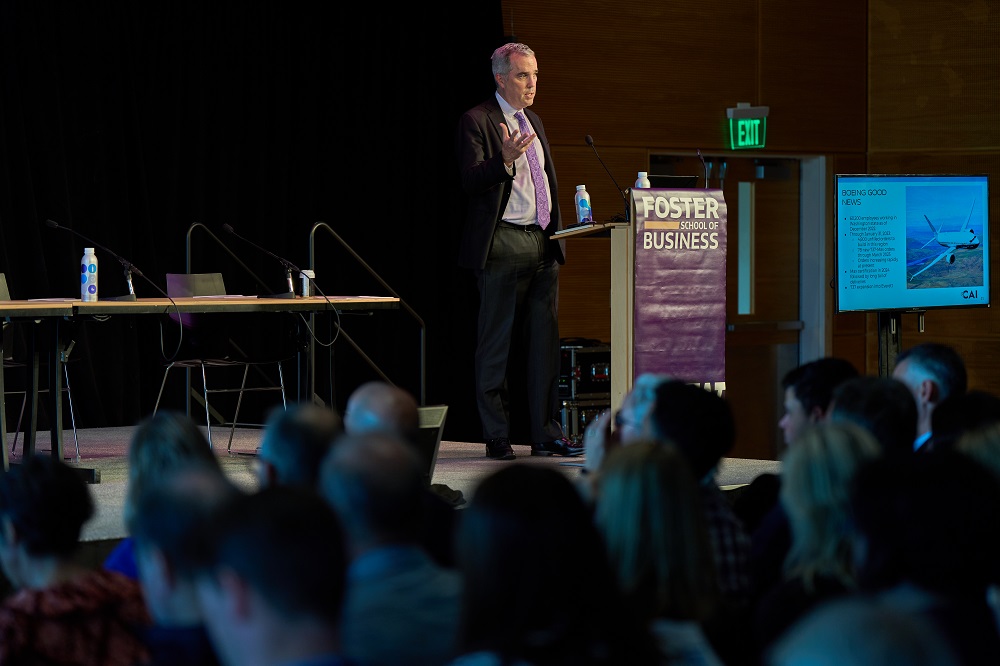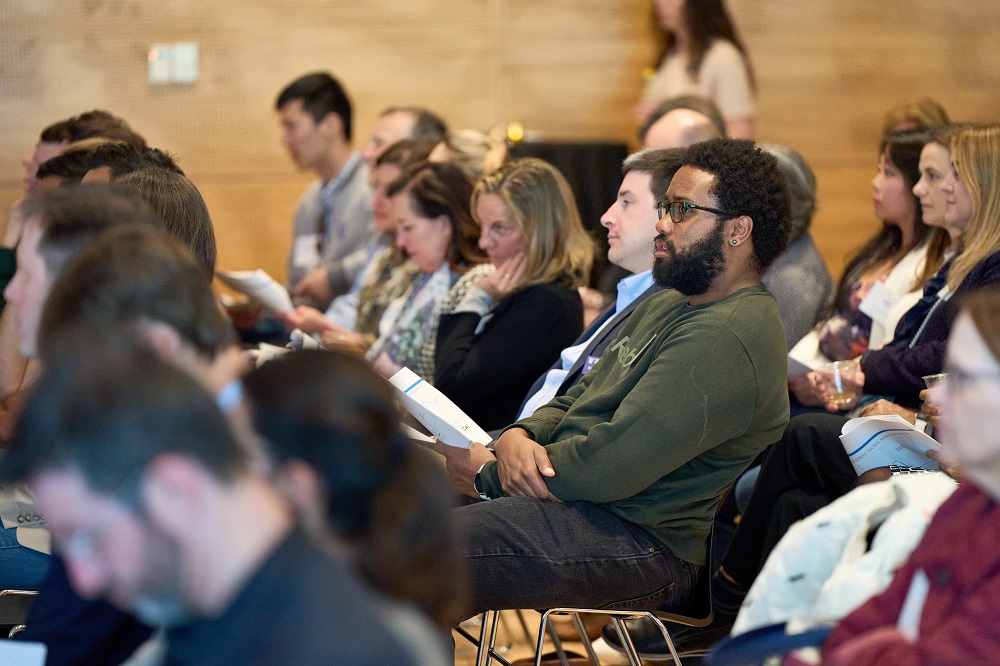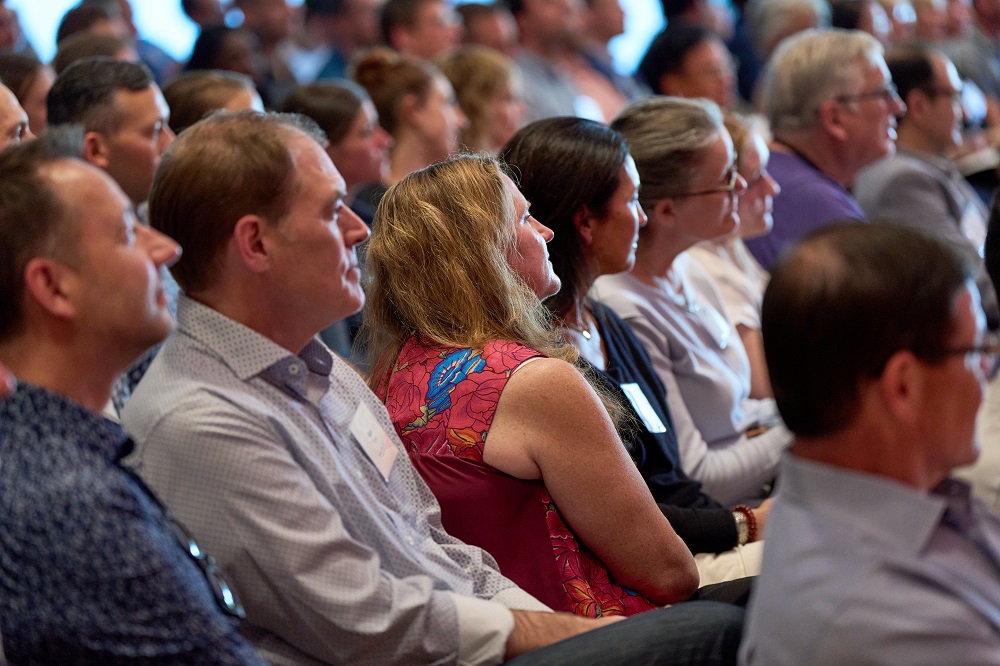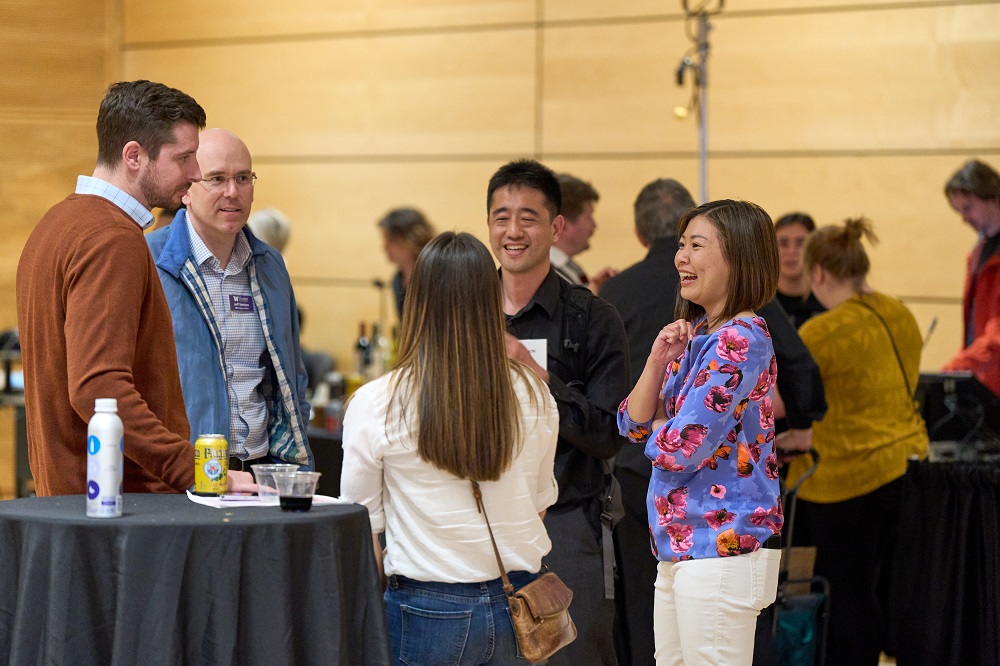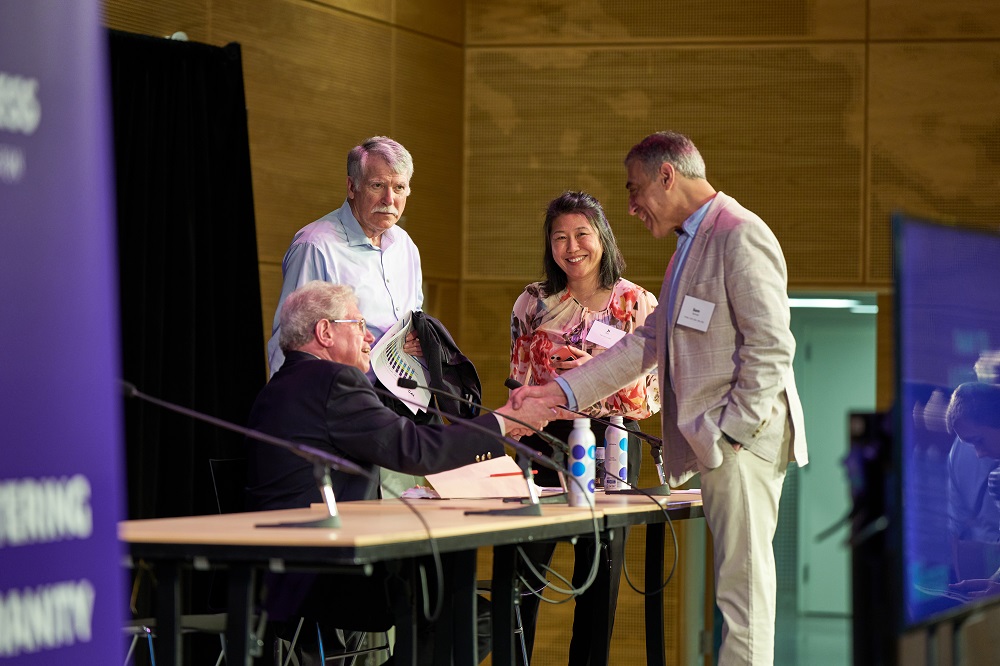“Recalibrating” at the State of the Economy Forum
Before launching into sober analysis at the Foster School’s annual State of the Economy Forum, presenter Chris Mefford (MBA 2002) opted to lead with a joke. Better yet, a dad joke. Texted just that morning from Mefford’s own father.
In the day’s “Pearls Before Swine” comic strip, a pig is taking an Econ 101 exam and pondering the question: “What is the significance of interest rates?” The pig writes, “A low interest rate means people have very little interest in what someone is saying. For example, when you teach economics, there is a very low interest rate.”
The roar of laughter around the packed Husky Union Building ballroom suggested just the opposite at this convocation of economic experts and enthusiasts.
For the first time in its 22 years, the State of the Economy Forum had a presenting partner in Whittier Trust, represented by Foster grad Nick Momyer (MBA 2006), the northwest regional manager and senior portfolio manager at Whittier.
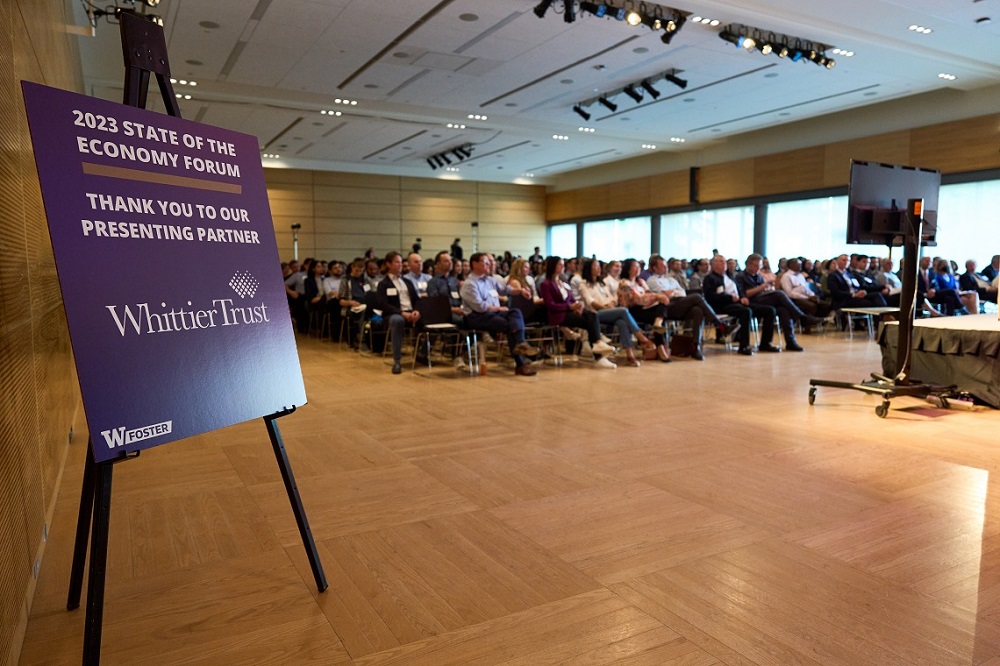
Whittier Trust was the first presenting partner in the 22-year history of the State of the Economy Forum.
A familiar panel of economic explainers was assembled once more: Mefford, president and CEO of the economic consulting firm Community Attributes; Debra Glassman, teaching professor of finance and business economics; Thomas Gilbert, associate professor of finance; and Ed Rice, assistant professor emeritus of finance and business economics (who referred to himself as a “makeshift professor” in his retirement). Moderating the proceedings, with customary charm and humor, was Dennis Karlinsky (MBA 2001), general manager/partner of Azure Engineering at Microsoft.
Before a massive in-person and online audience, these educated opinionators tackled a comprehensive range of current economic concerns, including banking, employment, housing, China relations, AI, inflation and, of course, interest rates.
States of the economies
For the first time in three years of economic forums, discussion was not dominated by the COVID-19 pandemic. Or even recovery from said pandemic.
Instead, Mefford laid out a new theme in his opening economic report: “recalibrating.” Or, as Rice would later term it, “the big shakeout.”
Citing a panoply of data, Mefford drew a distinction between the state of global and domestic economies. The world is still reeling from pandemic, supply chain, inflation and the war in Ukraine. But the United States economy, he said, appears to be stabilizing, albeit with a return to more historically realistic interest and growth rates and some rebalancing in the labor market.
He offered a generally bullish outlook on the region’s economy, rooted in diversified industries and robust exports. “We’re working our way out of Covid, recalibrating,” he said.
While he acknowledged that Seattle is suffering from a lagging rebound of its downtown core, a growing wealth gap and concerning trend of tech layoffs, it’s all relative.
“Seattle has problems,” Mefford said, “but we’ve got pretty good problems. Compared on a national scale to what other cities are going through, they’d love to have Seattle’s problems.”
Labor pains?
Following Mefford’s prelude, the panel dug into audience-generated questions. First up was employment.
Gilbert cited that, despite the headline-making layoffs at Meta, Microsoft, Amazon and Disney, the overall unemployment rate of 3.4% has not been seen since May 1969. It took just 29 months to recover jobs lost during the pandemic. He credited job cuts in the tech sector as a correction after a period of overheated growth fueled by a historically low cost of capital. “When we see declining numbers, this is a return to normal,” he said. “Some of these adjustments, while painful, are good.”
Glassman predicted rising unemployment, noting that there is, historically, a 1.5- to 2-year lag between interest rate hikes and corresponding layoffs. “If we predict that unemployment is going to go up as inflation goes down and unemployment is a lagging indicator,” she said, “then we may well be seeing an increase in unemployment play out through 2024.”
Rice took a broader view and pinned the coming rise in unemployment on a familiar culprit. “There was a big shock because of COVID,” he said. “The whole organization of businesses, supply chains, money given away for free—created a big shock. And when we have a big shock like this, lots of things change a lot. What we are seeing now is a shake out of these changes. There are going to be winners and losers.”
Inflation, whence and where to next?
Glassman pointed out that the debate over whether the current inflation was transitory or persistent ended about the time the Federal Reserve issued the first of ten interest rate hikes. “I’m starting to think that some of it was transitory after all,” she said. “And that that’s one of the reasons we’re seeing unemployment so low at a time when inflation is so high and is being fought with contractionary monetary policy.”
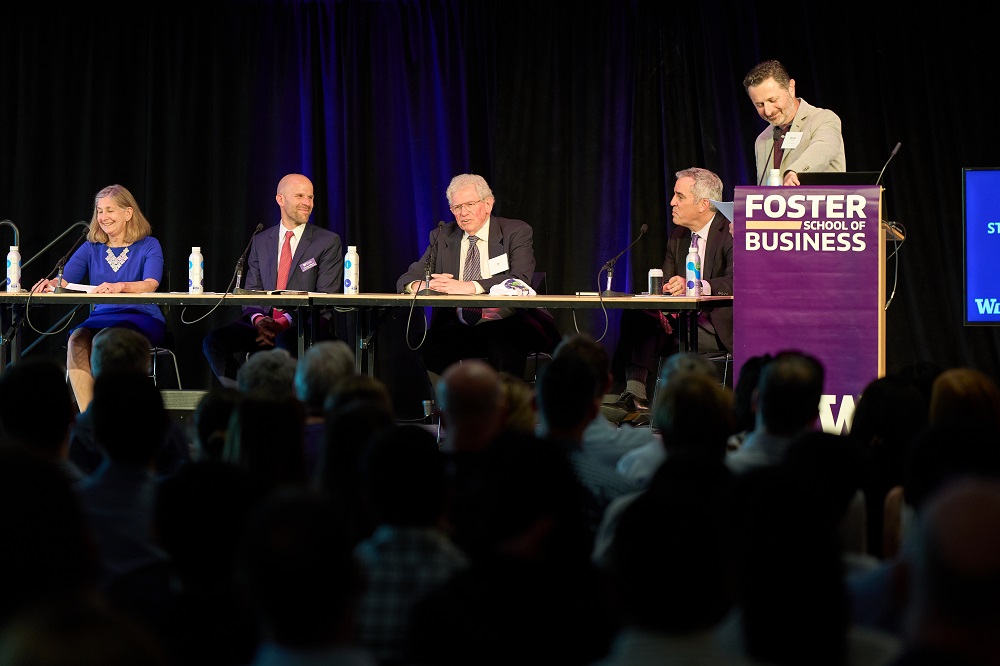
Panelists Debra Glassman, Thomas Gilbert, Ed Rice and Chris Mefford with moderator Dennis Karlinsky.
Rice, as he does, boiled it down to basics. “The increase in margins is a consequence of shifts, it is not a cause of shifts,” he said. “The idea that firms suddenly got greedy and increased their margins? Firms are always greedy, all the time every day—just like you are. These shifts are because of fundamental forces like you can’t get things loaded on or off the docks or there’s a war going on. These are things that cause shifts. Margins are an outcome.”
Gilbert pointed out that the manifestation of these forces is a “wage-price spiral.” “Higher wages will eat into profits of the firm, and then firms raise prices, pass it on to consumers, leading to higher wages,” he explained. “Higher wages lead to higher demand, higher demand leads to higher prices in a loop. All of the fundamental forces are driving these effects. And if we can’t get prices under control, as Jay Powell often says, it’s very hard to steer the economy going forward.”
Is the Fed handling inflation?
Rice delivered a basic economic lecture, involving apples, on the difference between real and marginal economics. The gist was that when the Fed issues an interest rate hike, it is reported as a nominal hike, lacking inflationary context. The real rate, he argues, is actually quite low. “Everything that matters is in real terms. If GDP is going up in nominal but not real terms, who cares? The real rate of interest through these rising rates has been severely negative… The Fed is not exploding interest rates,” Rice said. “The Fed is trying to get it close to a sensible real rate.”
Glassman followed up with a history lesson, pointing out that today’s Fed leadership was weaned on the lessons of the early 1980s, when Paul Volcker diagnosed runaway inflation as the result of a wage-price spiral (which economists now call an “expectations-augmented Phillips curve.”) “The only way to reduce inflation expectations was to crank up interest rates high enough and keep them high enough to throw the economy into inflation,” she said. “Jerome Powell and his colleagues are approaching current inflation in the same way. They are deliberately using the same words that Volcker used 40 years ago. And whether you agree with it or not, it’s important to understand what they believe and why they are acting that way. They are going to keep interest rates up until they see inflation come down to their target of 2%. Any talk of a cut in interest rates being just around the corner is wishful thinking.”
Is banking in crisis?
Mefford argued that the fall of Silicon Valley Bank was the fault of terrible management—and a failure of regulatory oversight. But he argued that “it’s not a nationwide banking problem unless there’s bad behavior from the top.”
Glassman explained that bank failures can be traced to government bonds—what we’ve always considered a “risk-free asset.” But when interest rates are rising quickly, those bonds can take on risk as they become worth less than what banks put on their books. The difference between the 2008 financial crisis is that it affected banks that were “too big to fail,” whereas those banks are seen as safe haven today versus regional banks like SVB.
 What concerns Glassman is that regional banks are the primary lenders of commercial real estate, which itself is suffering a serious downturn.
What concerns Glassman is that regional banks are the primary lenders of commercial real estate, which itself is suffering a serious downturn.
Gilbert wondered why anyone would be surprised that interest rates did not stay near zero forever, and noted the fascinating behavioral effect behind a bank run. “I believe that regulators did the correct thing,” he said. “The banking sector is critical; it’s an important pipeline for money to flow. When we are worried about these banks failing, we do want regulators to step in. I want to make clear that the government did not bail out the owners of these banks… When they insured large deposits, they made clear that any losses would be covered by asset shares. There was an element that we want to maintain confidence in these banks to ‘keep the pipes moving.’”
Is AI coming for your livelihood?
Currently teaching a machine learning class to Amazon managers, Gilbert mused on why artificial intelligence and machine learning are exploding now. He credits the invention in 2020 of the transformer neural network, an evolution in natural language processing that has led to ChatGPT and the like. But he insisted that these technologies are actually “very dumb. It only does one thing: It predicts the most likely next word based on a short memory of 1,000 prior words. That’s all it does… AI and machine learning do very narrow things.”
Rather than fear it, Gilbert expressed excitement about specializations of generative natural language processing for particular purposes. “Will some jobs disappear? Of course. Disruption always kills some jobs. But no one is sad that typing rooms or stagecoach manufacturers have gone out of business. New jobs will be created.
“Will your job disappear? I don’t think so. Will your job become more efficient? Absolutely.”
Not only did Gilbert promise that “SkyNet” is not imminent, he strongly encouraged non-computer scientists (read: business people) to engage in AI and machine learning without fear—and to help direct its development and evolution to be both useful and ethical.
What about China?
Glassman reported that the relationship between the world’s two superpowers is getting worse than better. Many trade barriers from the Trump administration have been left in place and the US is pushing hard against China’s efforts to develop computer chips, which could end up hurting us in the long run.
Rice noted that most economic models do not incorporate any benefit you get out of your trade partner being “happy or sad.” “When we have a competition for global domination—or whatever we and China are expecting—when we get sad, China is sad. And vice versa,” he said.
If we keep going down this path, “we are going to lose, in the long run, the gains we have made from trade.”
Where will the economy be a year from now?
Asked to make a prediction, Glassman led with an old standard. “Usually, I try to disagree with Ed,” she said. “But I’m going to do something even more dangerous and disagree with the IMF, the World Bank and the OECD. I’ve lost track of how many years I’ve predicted recession.”
“All of them,” quipped Mefford.
“A year from now, we’re going to be talking about the recession just past and the aftermath,” Glassman continued. “It would be great if the Fed could engineer a soft landing. But there are no examples in history where that worked.”
On the other hand, Gilbert ventured the bold prediction that we will not be in a recession this time next year. “We’re in this recalibration. But I’m confident in growth angles,” he said. “There are a lot of positive things on the horizon.”
Mefford advised that we “take a moment and enjoy the bliss of the political unity in this country… relative to what we’ll be experiencing one year from now.”
And Rice closed the prognostications—and the forum—with “some moody, gloomy things to say.” Namely, that China will take some kind of military action. “China is trying to do some stuff and it’s probably going to be bad,” he said.
“That’s what you’re going to end with?” puzzled Karlinsky. “China… stuff… bad?”
“Okay,” he added, to uproarious laughter. “That concludes our show.”
Photography by Paul Gibson.

